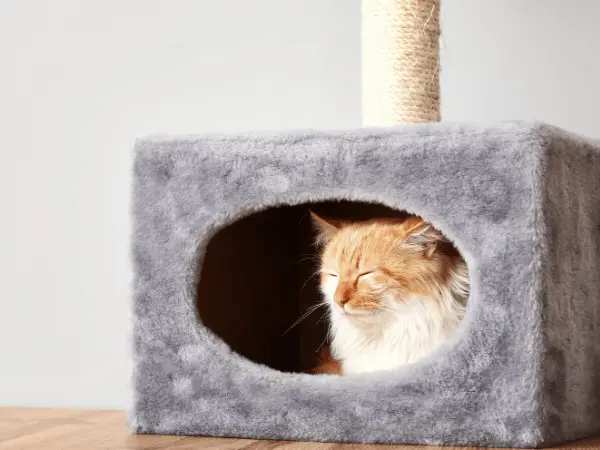Fireworks are a staple in certain celebrations, like the Fourth of July and New Year’s Eve. While we may marvel at the dazzling fireworks displays, our dogs and cats can find the loud explosions distressing. Some pets may suffer from fireworks anxiety and fear-related behaviors. However, this is just one of the ways that fireworks can impact pets.
In this complete guide, prepared by Sploot Veterinary Care, we talk about how fireworks can affect our canine and feline companions. We will also cover useful tips on protecting our pet’s health and well-being amidst fireworks festivities.
What’s in This Guide?
- Fireworks Anxiety & Distress in Pets
- → Why are Dogs & Cats Afraid of Fireworks?
- → Preventing Fireworks Anxiety in Dogs & Cats
- How Fireworks Impact a Pet’s Hearing
- → Can Fireworks Damage a Dog’s (or Cat’s) Hearing?
- → How to Protect Your Pet’s Ears Amidst Fireworks
- Pets & Firework Substances or Residues
- → What Happens if a Dog or Cat Eats Firework Substances
- → Prevention & Urgent Care for Fireworks Ingestion in Pets

Fireworks Anxiety & Distress in Pets
Many pet parents wonder: are all dogs and cats afraid of fireworks? The answer is no. Some dogs and cats can remain calm during fireworks festivities due to their disposition or due to behavioral training (i.e. desensitization to fireworks).
Why are Some Dogs & Cats Afraid of Fireworks?
Due to a pet’s heightened senses, fireworks can be overwhelming. The loud explosions and whistles of fireworks can lead to stress and anxiety. Though individual responses vary, pets can fear fireworks as much as thunderstorms.
In any case, pet parents need to recognize signs of distress in pets amidst fireworks festivities. These include the following:
- Hiding under furniture or in enclosed spaces
- Pacing and restlessness
- Uncharacteristic vocalization (barking, meowing)
- Destructive behaviors: chewing, scratching, or digging at doors and windows
- Loss of bowel or bladder control
- Trembling or shaking
- Trying to escape or run away
Preventing Fireworks Anxiety in Dogs & Cats
To mitigate the stress and anxiety fireworks cause, pet parents can try the following:
1. Desensitize Your Pet to Fireworks
Before the festivities, expose your pet to the sounds of fireworks at a low volume, gradually increasing the volume over time to help them become accustomed to the noise. You can also use treats and praise to create a positive association with the sound.
Note: It is important to take measures to prevent escape when getting your pet accustomed to firework sounds. In addition, make sure to reach out to a behavioral specialist if your pet’s responses are severe.
2. Create a Safe Space & Keep Your Windows Closed
Designate a quiet, comfortable area where your pet can retreat if they feel overwhelmed during the fireworks festivities. If your dog or cat is crate-trained, their crate can be a comforting place where they can hide.
Include familiar items like their bed, toys, and an article of your clothing to provide comfort through scent. Close the windows and doors, and draw curtains to muffle the sound and block out the flashes. Playing soft music or turning on the TV can help mask the noise of the fireworks.
Note: Keeping the windows closed in your home can help prevent escaping or running away, a fear response in some dogs and cats. In addition, if a dog would be outdoors near the time or during the fireworks display, make sure to keep them on a leash to prevent running away. However, it is ideal to keep pets indoors during fireworks festivities.
3. Make Sure Your Pet Gets Exercise
Ensuring that your dog or cat gets exercise before the fireworks festivities can help reduce anxiety and burn off excess energy. This helps some pets stay calmer during the noise.
4. Use Anxiety Aids for Pets
Consult a veterinarian about possible anti-anxiety medications for pets, anxiety wraps, and pheromone diffusers to help calm down your dog or cat. It is best to try out medications in advanced (with the guidance of a veterinarian) to ensure that you’ll have effective and suitable pet medications on-hand when the fireworks are expected.
Note: Each pet may react differently to anti-anxiety aids. Our veterinarians at Sploot can help you weigh the options and choose the anxiety aid/s that works best for your pet.
How Fireworks Impact a Pet’s Hearing
Pets have much more sensitive hearing than humans, perceiving fireworks as much louder, which unfortunately can lead to hearing damage.
Can Fireworks Damage a Dog’s (or Cat’s) Hearing?
Though NOT particularly common, prolonged or repeated exposure to the intense sounds of fireworks can lead to temporary or permanent hearing loss. Some pets may also develop tinnitus, a condition characterized by a ringing or buzzing in the ears.
How to Protect Your Pet’s Ears Amidst Fireworks
Reduce your pet’s exposure to fireworks by keeping them indoors during fireworks celebrations. Make sure that windows are closed. Doing so not only protects their hearing, but also prevents other accidents (e.g. getting burned or hit by fireworks, accidental ingestion).

Pets & Firework Residues or Substances
Another little-known danger concerning fireworks and pets is accidental ingestion of fireworks. Fireworks contain various chemicals and heavy metals, such as potassium nitrate, arsenic, and phosphorus, which are highly toxic if ingested.
What Happens if a Dog or Cat Eats Firework Substances?
If a dog or cat accidentally ingests fireworks substances or residues on the ground, they can develop the following symptoms:
- Gastrointestinal Upset: Vomiting, diarrhea, and abdominal pain.
- Neurological Signs: Tremors, seizures, and confusion.
- Respiratory Issues: Difficulty breathing and coughing.
Note: Reach out to an urgent care or emergency vet services provider immediately if your dog or cat is suspected to have ingested fireworks materials. If they are showing any of the above symptoms after accidental ingestion of fireworks, contact a veterinary ER as soon as possible.
Prevention & Urgent Care for Fireworks Ingestion in Pets
Keeping pets away from areas where fireworks have been set off and thoroughly cleaning up any residue or debris can help prevent accidental ingestion of fireworks material.
Final Thoughts on Fireworks and Pets
Fireworks pose various risks to pets, such as anxiety, hearing damage, and accidental ingestion of toxic residues. Implementing the preventive measures outlined above can help safeguard your pet’s well-being during fireworks celebrations on the Fourth of July or New Year’s Eve.
→ Learn More – Pup Safety During Fourth of July
→ Learn More – Keeping Pets Calm During New Year’s Eve
Sploot Vets: Your Go-To Vet, 365 Days a Year
Sploot Vets is here to provide exceptional, comprehensive veterinary care, 365 days a year with extended clinic hours. Book an appointment online or through the Sploot Vets app to consult our vets about preventing fireworks anxiety or any other concerns regarding your pet’s health.
For urgent care needs and pet emergencies within our clinic hours, feel free to contact our team!
As always, we are with you every pounce of the way!
